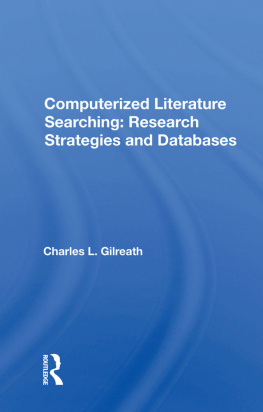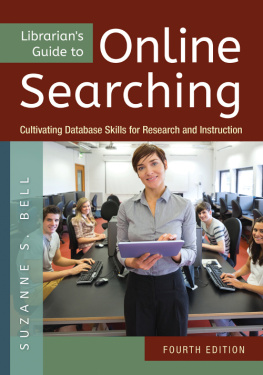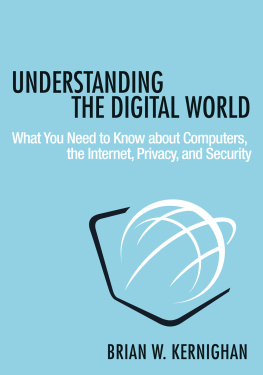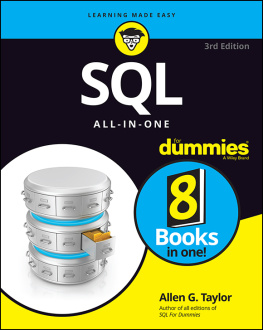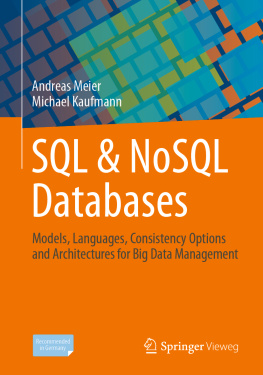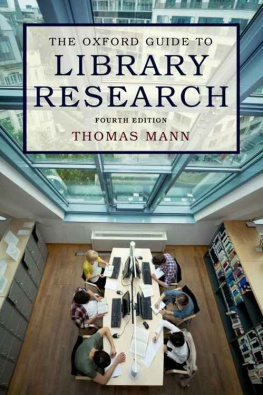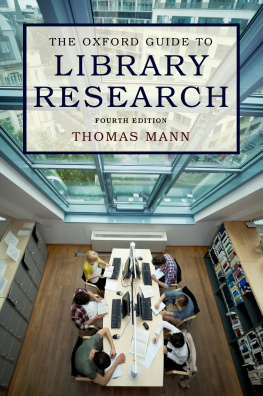Computerized Literature Searching
Also of Interest
Introduction to Library Research in Education, Jamie Wright Coniglio
Toward Effective Strategic Analysis: New Applications of Information Technology, Albert Clarkson
Introduction to Library Research in Women's Studies, Susan E. Searing
Secure Communications and Asymmetric Cryptosystems, edited by Gustavus J. Simmons
Doing Library Research: An Introduction for Community College Students, Robert K. Baker
Introduction to Library Research in French Literature, Robert K. Baker
Introduction to Library Research in German Studies, Larry L. Richardson
Information Services: Economics, Management, and Technology, edited by Robert M. Mason and John E. Creps
The Library of Congress, Second Edition, Charles A. Goodrum and Helen W. Dalrymple
Available in hardcover and paperback.
Westview Special Studies in Information Science and Management
Computerized Literature Searching: Research Strategies and Databases
Charles L. Gilreath
The computer terminal is well on its way to being as commonplace as the telephone, and its usefulness to the scholar and scientist is so great that already computer screens and disks are seen frequently in academic offices. The value of computers in research is well established, with vast amounts of data being processed daily by all sizes of computers. Computers also have had dramatic effects on the researcher's literature-searching options: Scientists and scholars can now query enormous databases containing tens of millions of citations to published literature and can extract bibliographies tailored to their specific questions. The power and flexibility afforded the user of information by these literature-searching systems ease the burden of library work, but in order to use the systems effectively, it is necessary to understand both their capabilities and their limitations.
Mr. Gilreath describes the principles underlying online bibliographic systems, the databases available, and the factors a researcher must consider in using them. He explores in some depth the relationship of the structure and terminology of publications in various fields to the literature-searching process and provides detailed guidelines for research in the life, health, agricultural, and social sciences, chemistry, physics, mathematics, geology, meteorology, engineering, education, psychology, business, law, current affairs, and the humanities. A glossary of literature-searching terms is included.
Charles L. Gilreath is head of the Automated Information Retrieval Service for Texas A&M University Library. He is the author of CAIN Online User's Guide (1976), AGRICOLA User's Guide (1979), and "Computerized Data Bases for Bibliographic Research" in Richard Blanchard's Guide to Sources for Agricultural and Biological Research (1981).
Computerized Literature Searching: Research Strategies and Databases
Charles L. Gilreath
First published 1984 by Westview Press, Inc.
Published 2018 by Routledge
52 Vanderbilt Avenue, New York, NY 10017
2 Park Square, Milton Park, Abingdon, Oxon OX14 4RN
Routledge is an imprint of the Taylor & Francis Group, an informa business
Copyright 1984 Taylor & Francis
All rights reserved. No part of this book may be reprinted or reproduced or utilised in any form or by any electronic, mechanical, or other means, now known or hereafter invented, including photocopying and recording, or in any information storage or retrieval system, without permission in writing from the publishers.
Notice:
Product or corporate names may be trademarks or registered trademarks, and are used only for identification and explanation without intent to infringe.
Library of Congress Cataloging in Publication Data
Gilreath, Charles L.
Computerized literature searching.
(Westview special studies in information science and management)
Includes index.
1. Online bibliographic searching. 2. Machine-readable bibliographic data. 3. Information retrieval. 4. ResearchMethodologyData processing. I. Title. II. Series.
Z699.G56 1984 025.5'24 83-23319
ISBN 13: 978-0-367-01968-6(hbk)
First, I would like to express my gratitude to Mr. Frederick Praeger, who sparked the idea of the book during a 1981 visit to Texas A&M to deliver a lecture on the future of scholarly publishing. At the time he mused that he might be delivering the funeral oration for that endeavor. I prefer to think that with men of his enthusiasm around, we may see, rather than the death of scholarly publishing, an intelligent transfiguration.
My thanks go also to a talented student assistant, Sohail Bokhari, for his invaluable assistance with the illustrations.
Finally, my thanks to my wife, Ann, who endured the initial writing and then proofread the results. The mistakes that remain I claim for myself.
C.L.G.
To assert that the computer has profoundly affected scholarship is to understate the case. Indeed, computer technology has opened avenues of research only dreamed of fifty years ago and but dimly understood even twenty years ago. The computer's impact on scholarly communication and library research is of more recent origin, yet in the past decade computer systems have begun to reshape at all levels the process of recording, transmitting, storing, and retrieving information.
As with many advances, the new technology forces the user to examine old methods, to think critically about those processes and techniques so long taken for granted. Such is the case with the computer systems that have been developed to assist in literature searching. The mechanics of computerized information retrieval make it relatively easy to pull some relevant citations from databases such as Sociological Abstracts or Zoological Record, but retrieving information in the most effective manner requires a thorough understanding of how information is organized. In the space of a single volume one cannot, of course, cover comprehensively the subtle differences in dozens of research fields. It is the goal of this work, rather, to alert the user of computerized library research services to potential problem areas and to cause him or her to ask the right questions in order to achieve the best results.
The user for whom this work is principally intended is the scientist or advanced student who is generally familiar with research in a given field but who may not know how to approach the development of search strategies for using computer literature-searching systems. Librarians and information specialists who have been called upon to conduct literature searches in fields unfamiliar to them will, one hopes, also find aid and comfort in these pages. The focus throughout has been on the subject matter and the structure of information in broad fields rather than on the selection or operation of specific retrieval systems, for which information abounds elsewhere.
The book is organized into eight sections: two chapters giving a general overview of computer library research systems and their capabilities and six others discussing research strategies for broad areas of research. Each discipline-oriented chapter is divided into three parts: a discussion of the general characteristics and the terminology peculiar to that field, a description of profiling aids that might be employed in constructing a search strategy, and a selective list of commonly available databases for that field.

